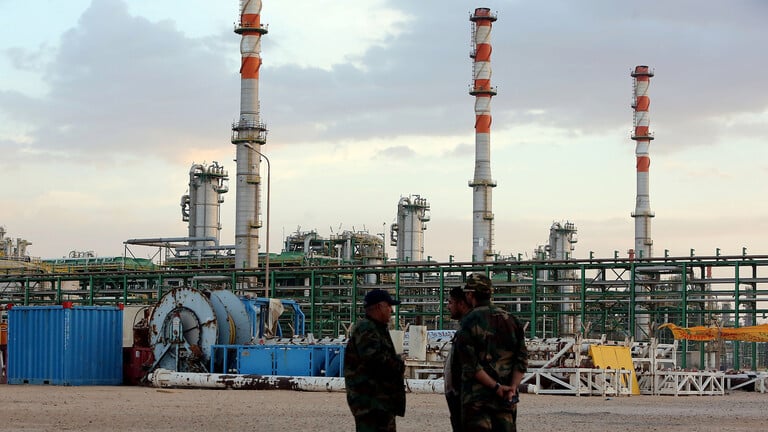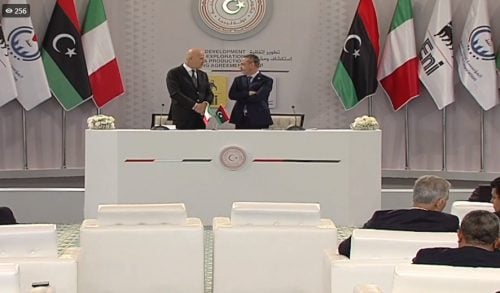The Italian Eni deal threatens to return the Libyan oil sector to the square it has suffered from for years due to the closure of ports and fields in light of the lack of political consensus in the country.
A state of confusion and skepticism has not stopped since the head of the National Oil Corporation, Farhat bin Qadara, announced a week ago his country’s intention to sign a deal with Italy with investments amounting to $8 billion to develop two gas fields in the Mediterranean, according to the specialized energy platform.
And between the illegality of the national unity government led by Abdul Hamid al-Dabaiba in signing agreements as expired, and between accusations of neglecting national gains in favor of the foreign partner, the objections did not stop, even after the signing of the deal with Eni last Saturday, in the presence of the Italian Prime Minister, Giorgio Meloni.
Threat to close fields and ports
The deputy head of the Supreme Council of Libya’s Tribes, Al-Senussi Al-Haliq, revealed upcoming movements in many oil sites in the country that may reach the point of closing ports and fields.
Today, Monday, January 30, he said that the tension in the Libyan street has reached an unprecedented degree, according to the Russian agency Sputnik.
He added that there are escalatory lines that the Libyan tribes will take in the coming days, in response to the agreement signed by the government of Abdul Hameed al-Dabaiba with Italy, describing the agreement as illegal.
He pointed out that the escalatory steps are to close the oil fields, ports and gas supply lines to Italy in all areas located in Sirte and the southeast.
Yesterday, Sunday, protesters stormed the Mellitah Oil and Gas Complex, the main point of the gas pipeline linking Libya and Italy, to protest the signing of the agreement between the two sides. Because the Dbeiba government does not have the authority to sign fateful agreements.
The protesters demanded that the agreement be halted, and some of them considered it a waiver of part of the state’s right to the gas fields in favor of the Italian company, Eni.
illegal agreement
Al-Senussi Al-Haliq explained that “the agreement signed by Dabaiba is illegal, a waste of the rights of Libyans, and a waste of public money, just as the same mistakes were made earlier with the French company, Total.”
According to Article 10 of the political agreement signed between the Libyan political forces, the government of national unity is not authorized to sign mandatory agreements with other countries, and this is the article on which the judiciary in Tripoli relied when it ruled the invalidity of the agreements signed between Dabaiba and Turkey.
Al-Senussi pointed out that “the Libyan tribes in the east intend to escalate matters to a large extent, especially since all oil money is controlled by insecure hands.
He stressed that “the Libyan tribes will move to close many oil fields in the southeast, in Sirte, and in all regions in eastern Libya.”

Mellitah Complex
Al-Senussi stressed that “closing the Mellitah oil and gas complex, the main point of the gas pipeline linking Libya and Italy, is a first step, after the signing of an agreement between the head of the unity government, Abdul Hamid al-Dabaiba, “from which Parliament withdrew confidence,” and the Italian Prime Minister, Georgia Meloni.
The head of the National Oil Corporation, Farhat bin Qadara, had confirmed that the terms of the agreement include the production of about 850 million cubic feet per day, and the development of two fields that were discovered according to the 2008 agreement.
He pointed out that the deal’s investments range from $7 to $9 billion, which will be pumped into the Libyan oil sector over the next 3 years, with expectations that it will generate net revenues of up to $13 billion for the state.
He explained that the reserves of the two fields are estimated at 6 trillion cubic feet, and they may pump at a rate of 750 million cubic feet per day for a period of 25 years.
The oil minister objects
Within hours of the signing of the deal, which was attended by the head of the national unity government, Abdul Hamid al-Dabaiba, Oil Minister Muhammad Aoun – a member of the government – who was not involved in the signing ceremony, came out to announce his objection to the agreement.
The Libyan Ministry of Oil indicated in a statement that the deal was illegal, noting that the National Corporation had amended Eni’s shares in production, which were agreed to be 30%, as it raised it to 37%.
For its part, the Libyan Oil Corporation confirmed in a previous statement, seen by the energy platform, that the percentage that some of them are talking about is not the percentage of sharing in the return, but rather the percentage allowed to recover capital costs in the project, i.e. the percentage allowed to be recovered from production to recover the capital costs of the project.
Libyan gas exports to Italy
Eni’s deal with the Libyan oil sector is one of the tools through which Italy seeks to increase its gas imports away from Russia.
Italy is connected to Libya by the Green Stream pipeline – which was built according to an agreement between the National Oil Corporation and Eni equally, although it is not operating at full capacity.
The gas is pumped from a gas compression station in the Mellitah complex – which was stormed after the deal – and sent through a 520-kilometer line to another gas-receiving station on the island of Sicily. Most of Libyan gas exports are produced from the Bahr al-Salam field, and from the Wafa field in the southwest of the country, and it is sent to the complex. Processed before exporting to Italy.

Eni’s president, Claudio Descalzi, said in recent statements that the Green Stream pipeline has a capacity of between 12 and 14 billion cubic meters, and it can be increased by a few billion using the appropriate pressure.
Eni’s agreement with the Libyan National Oil Corporation coincides with the launch of the “Mate Plan” requested by Prime Minister Meloni, which aims to deepen political and energy relations between Italy and the African continent.
Italy believes that its project in Libya does not face significant risks above ground associated with the country’s onshore oil and gas infrastructure, including exposure to sabotage and attack.
The flow of gas from Libya to Italy has slowed in the past two years, and is currently about 7-8 million cubic meters per day. In the period from January to November 2022, Italy imported about 2.3 billion cubic meters of gas from Libya, compared to 3 billion cubic meters in the same period of 2021.
In 2019, from January to December, Italy imported about 5.7 billion cubic meters of gas through Green Stream.
related topics..
Also read..

Leave a Reply